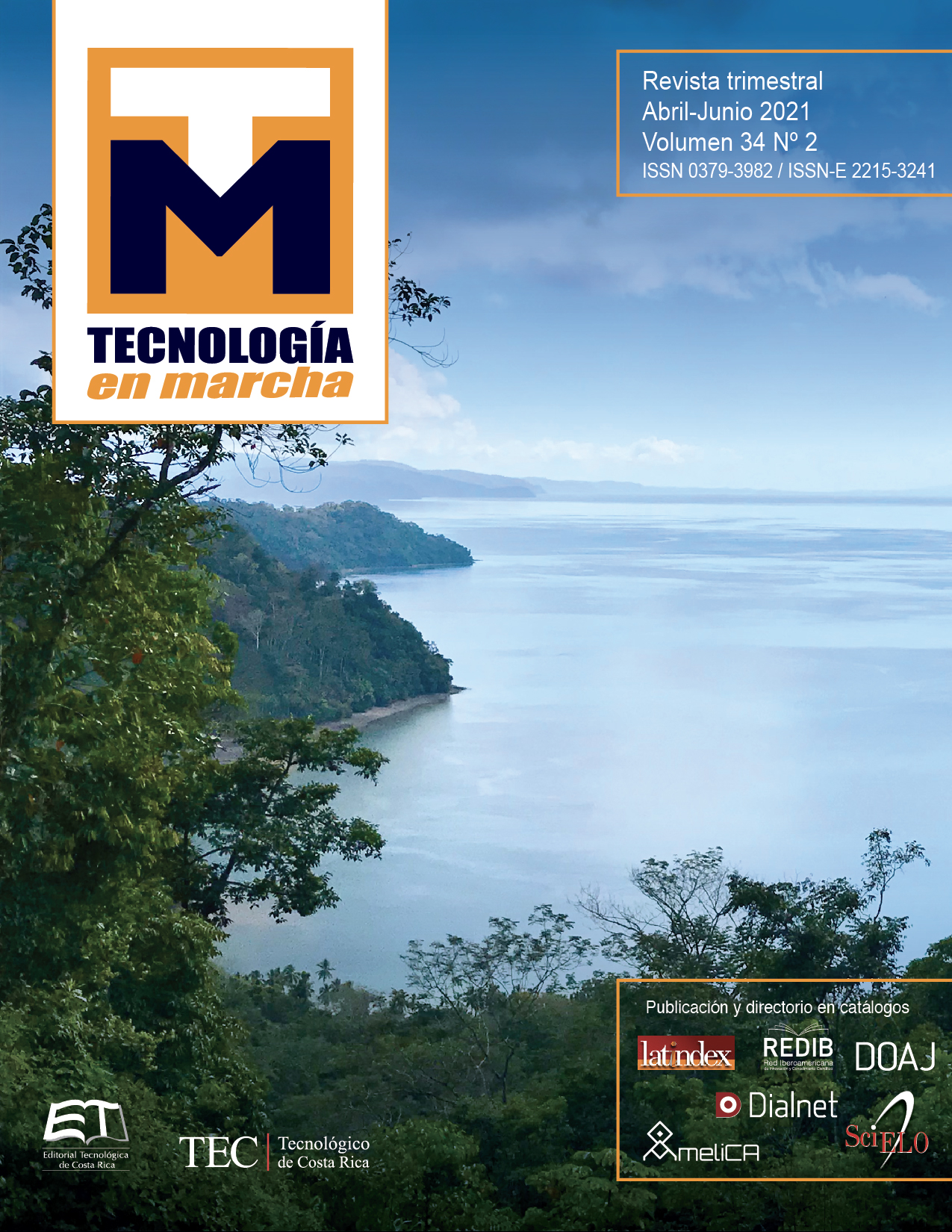Food loss and waste in food services from educational institutions in Costa Rica
Main Article Content
Abstract
One-third of the worldwide food production is lost or wasted, generating impacts in the food systems. However, data indicates that one in nine people suffer from undernourishment or shortage of food in the world. Furthermore, this problem generates adverse impacts in the environment and the economy. Costa Rica is not exempt from this phenomenon; therefore, in compliance with target 12.3 of the Sustainable Development Goals, the country initiated actions through the Costa Rican Food Loss and Waste Reduction Network and one of its members, the Costa Rican Network of Sustainable Educational Institutions (REDIES). This latter committed itself to quantify the food loss and waste (FLW) in the canteens from a pilot group of their members. The objective of this case study was to determine the FLW in the restaurants of five institutions to generate data experience that allows to create indicators and useful information in the search for strategies against food waste. The amount of FLW was measured using the standardized methodology explained in the Guide for this purpose, published by the Costa Rican Network. In general terms, most FLW in this case study comes from the amount of food leftovers. Consequently, it is concluded and recommended to focus on awareness campaigns, quality and portioning to address the issue, and to consider that each institution must place emphasis through its reduction plan with respect to the findings generated in each food service or canteen.
Article Details

This work is licensed under a Creative Commons Attribution-NonCommercial-NoDerivatives 4.0 International License.
Los autores conservan los derechos de autor y ceden a la revista el derecho de la primera publicación y pueda editarlo, reproducirlo, distribuirlo, exhibirlo y comunicarlo en el país y en el extranjero mediante medios impresos y electrónicos. Asimismo, asumen el compromiso sobre cualquier litigio o reclamación relacionada con derechos de propiedad intelectual, exonerando de responsabilidad a la Editorial Tecnológica de Costa Rica. Además, se establece que los autores pueden realizar otros acuerdos contractuales independientes y adicionales para la distribución no exclusiva de la versión del artículo publicado en esta revista (p. ej., incluirlo en un repositorio institucional o publicarlo en un libro) siempre que indiquen claramente que el trabajo se publicó por primera vez en esta revista.
References
FAO, Food Wastage Footprint: Full Cost-A ccounting. Final Report., Roma, Italia: FAO, 2014.
FAO, OPS, WFP y UNICEF, “Panorama de la seguridad alimentaria y nutricional en América Latina y el Caribe 2018,” 2018. [Online]. Available: http://www.fao.org/3/CA2127ES/CA2127ES.pdf.
K. Kibler, D. Reinhart, C. Hawkins, A. Mohaghegh Motlag and J. Wright, “Food waste and the food-energy-water nexus: A review of food waste management alternatives,” Waste Management, Volume 74, pp. 52-62 https://doi.org/10.1016/j.wasman.2018.01.014, 2018.
FAO, “FAO and the SDSs. Indicators: Measuring up to the 2030 Agenda for Sustainable Development,” 2017. [Online]. Available: http://www.fao.org/3/a-i6919e.pdf
FAO, “Pérdidas y Desperdicios de Alimentos en América Latina y el Caribe.,” 2016. [Online]. Available: www.fao.org/publications .
S. Corrado, C. Caldeira, M. Eriksson, O. Jørgen Hanssen, H.-E. Hauser, F. van Holsteijn, G. Liu, K. Östergren, A. Parry and L. Secondi, “Food Waste accounting methodologies: Challenges, opportunities and further advancements,” Global Food Security 20, pp. 93-100 https://doi.org/10.1016/j.gfs.2019.01.002, 2019.
M. Canali, P. Amani, L. Aramyan, M. Gheoldus, G. Moates, K. Östergren, K. Silvennoinen, K. Waldron and M. Vittuari, “Food Waste Drivers in Europe, from Identification to Possible Interventions,” Sustainability 9, 37, p. doi:10.3390/su9010037, 2017.
M. Ferreira, M. L. Martins and A. Rocha, “Food waste as an index of foodservice quality,” British Food Journal Vol. 115 No. 11, pp. 1628-1637 DOI 10.1108/BFJ-03-2012-0051, 2013.
L. Falasconi, M. Vittuari, A. Politano and A. Segrè, “Food Waste in School Catering: An Italian Case Study,” Sustainability 7, pp. 14745-14760; doi:10.3390/su71114745, 2015.
P. Manomaivibool, C. Chart-asa and P. Unroj, “Measuring the Impacts of a Save Food Campaign to Reduce Food Waste on Campus in Thailand,” Applied Environmental Research 38 (2), pp. 13-22, 2016.
TEC, “RED COSTARRICENSE PARA LA DISMINUCIÓN DE PÉRDIDAS Y DESPERDICIOS DE ALIMENTOS,” 2017. [Online]. Available: https://www.tec.ac.cr/red-costarricense-disminucion-perdidas-desperdicios-alimentos.
PDA CR, “Guía para la Medición del Desperdicio de Alimentos en cocinas Institucionales o Comerciales,” 2017. [Online]. Available: https://www.tec.ac.cr/sites/default/files/media/doc/2_guia_medicion_cocinas_web.pdf.
Rojas-Vargas, J; Monge-Fernández, Y and Fernández-Hidalgo, K. “Desperdicios de alimentos (DA) en sodas concesionadas de una Universidad Pública en Heredia, Costa Rica”. Tecnología en Marcha 33(1), p152-164.https://doi.org/10.18845/tm.v33i1.50291, 2020.
INCAP, “Tabla de composición de Alimentos de Centroamérica, 2da edición. ISBN 999922-880-2-7,” 2012. [Online]. Available: http://www.sennutricion.org/media/tablas/INCAP.pdf.
Minitab, “Soporte de Minitab,” 9 agosto 2019. [Online]. Available: https://support.minitab.com.
Y. Chan and R. P. Walmslqr, “Learning and Understanding the Kruskal-Wallis One-Way Analysis-of Variance-by-Ranks Test for Differences Among Three or More Independent Groups,” Physical Therapy, p. 1755, 1997.
B. Ravandi and N. .Jovanovic, “Impact of plate size on food waste : Agent-based simulation of food consumption.,” Resources, Conservation & Recycling, 149, p. 550–565. https://doi.org/10.1016/j.resconrec.2019.05.03, 2020.
S. Ahmed, C. Shanks, M. Lewis and A. Leitch, “Meeting the food waste challenge in higher education challenge,” International Journal of Sustainability in Higher Education 19 (6), pp. 1075–1094. https://doi.org/10.1108/IJSHE-08-2017-0127, 2018.
Sistema Costarricense de información jurídica. Ley no 8839 para la Gestión Integral de Residuos. Online. Available at https://www.pgrweb.go.cr/scij/Busqueda/Normativa/Normas/nrm_texto_completo.aspx?param1=NRTC&nValor1=1&nValor2=68300&nValor3=83024&strTipM=TC
WRAP, “Hospitality and Food Service Reducing Food Waste: Starting Off.,” WRAP, United Kingdom, 2014.
B. Ellison, O. Savchenko, C. Nikolaus and B. Duf, “Every plate counts : Evaluation of a food waste reduction campaign in a university dining hall,” Resources, Conservation & Recycling, 144(, p. 276–284. https://doi.org/10.1016, 2019.

